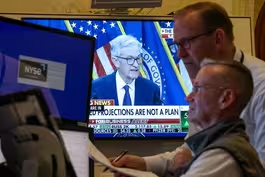
How misinformation spread after Minnesota lawmaker's murder
Clip: 6/18/2025 | 6m 58sVideo has Closed Captions
How misinformation spread after Minnesota lawmaker's murder
As news about the murders in Minneapolis broke over the weekend, misinformation began spreading on social media instantly. And in an era of artificial intelligence and limited internal fact-checking, experts say rumors and disinformation are catching fire online in entirely new ways. Stephanie Sy sits down with experts to separate fact from fiction.
Problems playing video? | Closed Captioning Feedback
Problems playing video? | Closed Captioning Feedback
Major corporate funding for the PBS News Hour is provided by BDO, BNSF, Consumer Cellular, American Cruise Lines, and Raymond James. Funding for the PBS NewsHour Weekend is provided by...

How misinformation spread after Minnesota lawmaker's murder
Clip: 6/18/2025 | 6m 58sVideo has Closed Captions
As news about the murders in Minneapolis broke over the weekend, misinformation began spreading on social media instantly. And in an era of artificial intelligence and limited internal fact-checking, experts say rumors and disinformation are catching fire online in entirely new ways. Stephanie Sy sits down with experts to separate fact from fiction.
Problems playing video? | Closed Captioning Feedback
How to Watch PBS News Hour
PBS News Hour is available to stream on pbs.org and the free PBS App, available on iPhone, Apple TV, Android TV, Android smartphones, Amazon Fire TV, Amazon Fire Tablet, Roku, Samsung Smart TV, and Vizio.
Providing Support for PBS.org
Learn Moreabout PBS online sponsorshipAMNA NAWAZ: As news about the murders in Minneapolis broke over the weekend, misinformation began spreading on social media instantly.
GEOFF BENNETT: And in an era of artificial intelligence and limited internal fact-checking, experts say rumors and disinformation are catching fire online in entirely new ways.
Stephanie Sy sits down with experts to separate facts from fiction.
STEPHANIE SY: It happened almost immediately.
MAN: Today, we are asking for the public's help in locating Vance Luther Boelter.
STEPHANIE SY: While investigators were still chasing down the man in Minnesota accused of killing a state lawmaker and her husband.
DONALD TRUMP JR., Son of Donald Trump: It seems like he went after a Democratic legislator because she voted against Democrat Party policy.
STEPHANIE SY: Political influencers online were already claiming to know his motives.
In Washington, D.C., President Trump's military parade over the weekend was either huge or puny.
MAN: There was just no people there.
STEPHANIE SY: Depending on which set of images one saw.
And on the streets of Los Angeles, where most protests of ICE raids were nonviolent, you would never know that from the sometimes inaccurate images that went viral online.
DAVID GILBERT, Wired: Trying to access verifiable and accurate information on the Internet at the moment is as difficult as I think it's ever been.
STEPHANIE SY: David Gilbert is a reporter at Wired.
He's been covering misinformation for over a decade.
DAVID GILBERT: When breaking news happens, at this point, you can almost guess what some of the disinformation narratives are going to be.
For example, around the L.A. protests, we saw reusing old footage,people using footage from the George Floyd protests in 2020.
We saw people using footage from the Arma 3 video game, which is a war game.
So they used footage from that and claimed that it was from L.A. We saw George Soros being blamed that all the protesters were being paid, something that Donald Trump amplified himself last week.
DONALD TRUMP, President of the United States: These are paid troublemakers.
They get money.
DAVID GILBERT: You still have all of this, but then you're putting the A.I.
on top of it, making it so much worse.
MAN: Hey, everyone, Bob here on National Guard duty.
STEPHANIE SY: A.I.-generated videos like this one featuring a purported member of the National Guard in Los Angeles were spread on social media last week.
DAVID GILBERT: If you looked at the A.I.
videos that people believed were real, there were issues with people's faces, issues with the signs in the background, lots of very clear signals that it was A.I.
But people just don't pay that much attention anymore.
People want to be the first person to share it.
RENEE DIRESTA, Author, "Invisible Rulers: The People Who Turn Lies into Reality": That desire to be first, that desire to be the person who is breaking the story or has the image, it really happens over and over and over again.
STEPHANIE SY: Renee DiResta is the author of Invisible Rulers: The People Who Turn Lies into Reality."
She says social media companies incentivize viral, not necessarily truthful content.
RENEE DIRESTA: People begin to realize that during chaotic events, they could actually capitalize on that chaos.
They could push out false and misleading stories.
They could dredge up old protest footage, reamplify it, pretend it was happening right then, and they could actually monetize that.
They could kind of capture attention.
And certain platforms actually let people who are pushing out what looks like current content make money off of it.
STEPHANIE SY: And you say that the social media platforms are aware of these incentives, are aware that people are capitalizing on these events, and do they facilitate that?
RENEE DIRESTA: Well, the incentives are not necessarily made for the worst actors, right?
The incentives are there because we should want people to be able to break news in their communities, right?
If this was a situation where I'm just out there on my street with my camera phone and I happen to record something, we should want me to be able to get that information out there.
When people do this ethically, it's incredibly powerful.
STEPHANIE SY: And once viral, content, true or not, often finds its way onto multiple platforms, like this video that was likely posted on Instagram before getting attention on Bluesky last week.
RENEE DIRESTA: The officers were wearing NYPD uniforms, and they were separating a baby and a mom, and it was being pushed out as if this was an ICE raid and a family was being separated.
It actually took me a while to try to figure out if it was A.I.-generated or not or if it had been edited or not.
And in the time it took me to do that, about 6,000 people had retweeted it.
STEPHANIE SY: After studying the video, DiResta believes it's real, but that it likely shows old footage and not a recent ICE raid.
MARK ZUCKERBERG, CEO, Meta: First, we're going to get rid of fact-checkers and replace them with community notes similar to X. STEPHANIE SY: Meanwhile, with major platforms rolling back fact-checking, more and more people seem to be turning to chatbots to discern what is real, X's Grok or ChatGPT, for example.
DAVID GILBERT: People have been asking Grok, which is built into X, and ChatGPT to verify images and videos and statements by lawmakers, and instead of coming back with accurate information, it's actually coming back with disinformation.
STEPHANIE SY: He points to a recent example, when California Governor Gavin Newsom posted these images of National Guard troops on his X account,apparently to prove President Trump had sent troops that had no place to sleep.
DAVID GILBERT: So someone asked Grok, said, is this photo real?
And Grok came back saying, it looks like the photo was taken in Afghanistan in 2021 in Kabul Airport during the U.S. troop withdrawal.
STEPHANIE SY: Grok was wrong.
The images were real, originally sourced by The San Francisco Chronicle and deemed by the Department of Defense itself as appearing authentic.
DAVID GILBERT: These A.I.
chatbots, which have been so lauded as revolutionary, as cutting-edge from a tech perspective, still have huge issues in producing accurate, fact-checked, verified information.
And this is just the latest example.
I think the reliance on these chatbots by a lot of people is a worrying escalation, because people are turning to them now because they don't actually have human fact-checkers anymore at these companies that they can ask.
STEPHANIE SY: As our reliance on A.I.
grows, so too does fear about how it will shape our future.
RENEE DIRESTA: We're in really chaotic times, and the ability to create very plausible unreality is only getting better, even as our trust in each other continues to decline.
As the people and outlets that we put our faith in continues to diverge, more and more, it's going to be impossible for us to come to consensus about basic reality, and that unfortunately is where we are.
STEPHANIE SY: Where we are itself now a point of contention in a world of fractured realities.
For the "PBS News Hour," I'm Stephanie Sy.
Biography documents life of pioneering LGBTQ rights activist
Video has Closed Captions
Clip: 6/18/2025 | 6m 12s | New biography documents life of pioneering LGBTQ rights activist Marsha P. Johnson (6m 12s)
Homeland Security official on Trump's immigration policy
Video has Closed Captions
Clip: 6/18/2025 | 9m 28s | Homeland Security official on the Trump administration's immigration policy changes (9m 28s)
Iran rejects Trump's calls for surrender amid Israeli attack
Video has Closed Captions
Clip: 6/18/2025 | 3m 27s | Iran rejects Trump's calls for surrender amid Israel's ongoing bombardment (3m 27s)
Israel's attack on Iran puts the U.S. in a difficult spot
Video has Closed Captions
Clip: 6/18/2025 | 7m 33s | How Israel's attack on Iran puts the U.S. in a difficult situation (7m 33s)
News Wrap: Fed leaves interest rates unchanged
Video has Closed Captions
Clip: 6/18/2025 | 5m 24s | News Wrap: Fed leaves interest rates unchanged while signaling future cuts (5m 24s)
States agree to Purdue Pharma settlement over opioid crisis
Video has Closed Captions
Clip: 6/18/2025 | 5m 58s | U.S. states agree to multi-billion dollar settlement with Purdue Pharma over opioid crisis (5m 58s)
Supreme Court upholds law banning gender-affirming care
Video has Closed Captions
Clip: 6/18/2025 | 8m 1s | Supreme Court upholds Tennessee law banning gender-affirming care for transgender minors (8m 1s)
Providing Support for PBS.org
Learn Moreabout PBS online sponsorshipSupport for PBS provided by:
Major corporate funding for the PBS News Hour is provided by BDO, BNSF, Consumer Cellular, American Cruise Lines, and Raymond James. Funding for the PBS NewsHour Weekend is provided by...


















